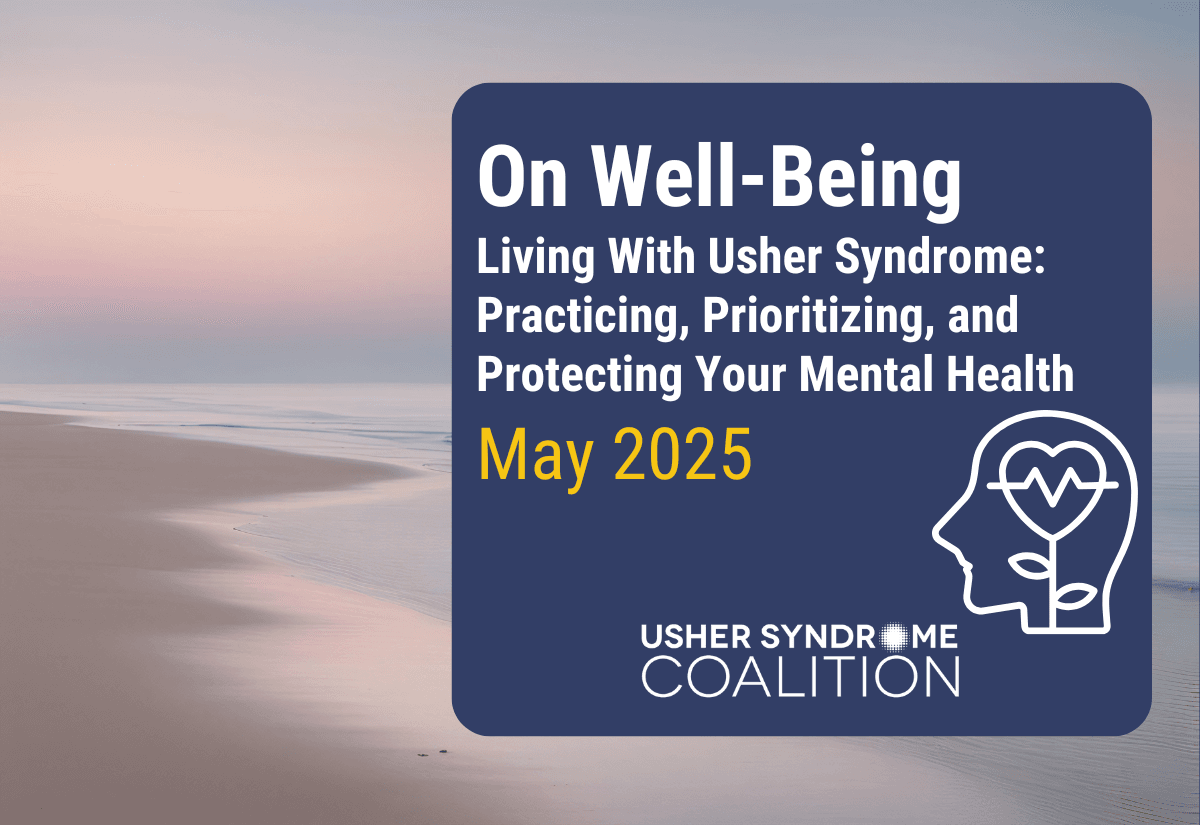
Getting an Usher syndrome diagnosis isn’t a single, life-altering moment - it’s a process. A series of reckonings. A gradual evolution of internal and external shifts. Some are quiet and subtle; others hit hard and feel gut-wrenchingly sad. What’s certain is that it’s never just about your vision or hearing. It’s about your identity, your independence, your relationships (especially with yourself), your livelihood, your confidence, your future, and your sense of safety in the world.
My diagnosis didn’t arrive all at once - it unfolded in stages. Genetic testing and early screening have come a long way since then, but when I was told I would lose both my vision and hearing, I couldn’t wrap my head around it. None of us can. The reality settled in slowly - struggling to read a menu in dim light, hesitating at a busy crosswalk, missing a punchline in a loud room. The world became harder to navigate before my emotions could catch up.
As a psychotherapist, I understand that grief doesn’t wait until after the loss. It’s there with you while you're still functioning, still showing up, still doing your best. That’s what makes living with Usher syndrome so complex. You’re adjusting to what’s slipping away, trying to stay grounded in what remains, and bracing for what’s next. It’s a constant balancing act between presence and preparation, acceptance and anticipation.
There’s no single right way to cope, but these practices have been essential for me:
- Make room for all of it. Gratitude and grief often coexist. You can be thankful for what you have and still mourn what’s changing or what you’ve lost. That’s not a contradiction - it’s what makes us human. The more space you allow for the full range of emotions, the more compassionate your relationship with yourself will become.
- Let people in. An Usher syndrome diagnosis won't break your spirit - but isolation can. Whether it’s a therapist, a trusted friend, or someone who just “gets it,” connection is essential. You don’t have to do this alone. Support reshapes how we cope.
- Name what you feel and what you need. The more clearly you can express your experience, the easier it is for others to support you - and for you to stay connected to yourself. Saying, “I’m doing my best, but this is really hard,” or “I’d love to join, but I’ll need a ride,” doesn’t make you a burden. It means you're honest, and it allows others to connect with you.
- Practice non-judgmental self-awareness. Notice what you’re feeling without rushing to fix it, numb it, or push it away. Some days are just hard. That’s okay. Let it be true.
- Come back to your breath.
Close your eyes or lower your gaze. Place one hand on your chest or belly.
Feel the gentle expansion and release of your breath.
You don’t need to change anything - just notice.
Let your breath anchor you in the present moment. This is your home base. - Give yourself time to grieve. Grief doesn’t define you - it makes space for joy, connection, and wholeness. Mourning what’s changed and what may still change is not weakness - it’s part of being deeply human.
About Rebecca Alexander:
As an adolescent, Rebecca received a life-changing diagnosis: retinitis pigmentosa (RP), a rare genetic condition that would gradually narrow her sight until she was completely blind, likely by age 30. At 19, still recovering from a fall that left her athletic body shattered, Rebecca was diagnosed with Usher syndrome, the leading genetic cause of combined blindness and deafness.
Now in her 40s, living with a sliver of sight and total deafness without cochlear implants, Rebecca faces life with unwavering determination and a deep commitment to connection. Through her journey, she proves that life’s greatest challenges can open the door to profound strength and a deeper sense of self.
With two Master’s degrees from Columbia University and advanced certifications, Rebecca has a thriving psychotherapy practice in Manhattan. Rebecca also created and facilitates an in-depth mental health curriculum for mental health professionals as well as for organizations.
To learn more about Rebecca, visit her website here or follow her on Instagram here.







